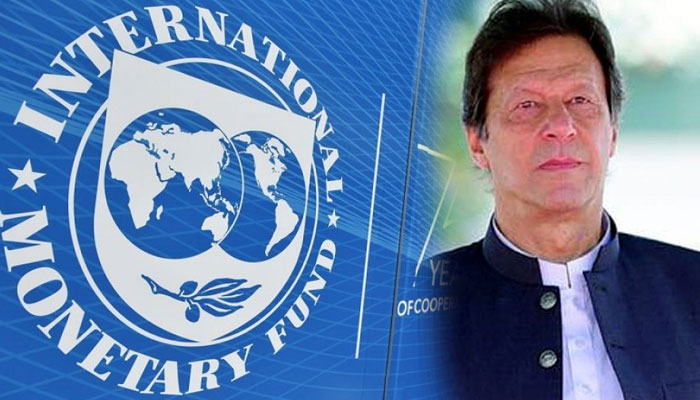Pakistan, IMF at loggerheads over financing of budget deficit
ISLAMABAD: The International Monetary Fund (IMF) and Pakistani authorities are at loggerheads over financing of the yawning budget deficit for the current fiscal year as the Fund is asking for slashing down the budget deficit as well as the gross financing requirements, it is learnt.
There are other issues as well, including hiking electricity tariff by 30 percent, erasing the monster of circular debt and coming up with a plan to stop its accumulation of Rs44.8 billion on a monthly basis. The monthly recovery of electricity bills has also decreased in the aftermath of COVID-19 pandemic, so woes of the cash bleeding power sector are multiplying.
Some important structural and legal reforms such as autonomy to the State Bank of Pakistan (SBP), bringing amendments to Nepra and others are also among major pending issues. But the yawning budget deficit and financing of this deficit has emerged another burning issue during recently-held online interaction between the two sides.
There are two issues confronting the IMF authorities — the first is curtailing the budget deficit with primary focus to restrict the primary deficit, and second how the government arranges financing to fill this gap between revenue and expenditure. As the borrowing from the SBP is not allowed under the IMF programme, so the Ministry of Finance has to move cautiously to manage financing for the increasing budget deficit.
“The gross financing needs should be reduced as the overall deficit has been estimated at 7 percent of GDP, so its financing should be focused more,” said the IMF high-ups during recently held virtual meeting between the two sides. But the government considers that in case of frequent market operation through T-bills and PIBs, it would look like desperate borrowers so the market could get wrong signals and it might result into getting dictations on monetary front.
“We have informed the IMF that the Ministry of Finance is managing financing requirements cautiously with the objective to strike balance as through market operation the government raised more money through last auction thus it resulted into net retiring of debt to the tune of Rs90 billion,” said the official.
The official said the government brought down the budget deficit from expected level of 9.1 percent to 8.1 percent in the last fiscal year that ended on June 30, 2020. Now the government has envisaged restricting the budget deficit at 7 percent of GDP, equivalent to Rs3,195 billion. The target of primary deficit has been envisaged at Rs249 billion for the current fiscal year, but the Ministry of Finance high-ups argued that they convinced the IMF to keep it at 0.55 percent of the GDP for the current fiscal year.
However, independent economists did not agree with the government and argued that the fiscal situation was worsening that might result into surfacing of demand from IMF for presenting a mini-budget because of the possibility of FBR revenue shortfall and overrun in expenditure side.
They proposed that the incumbent regime should have convinced the IMF for allowing COVID-19 related spending of 2 to 2.5 percent of GDP without making it part of a budget deficit that could provide a solution to continue with more stimulus for kick-starting the sluggish economic activities.
-
 Eric Dane's Girlfriend Janell Shirtcliff Pays Him Emotional Tribute After ALS Death
Eric Dane's Girlfriend Janell Shirtcliff Pays Him Emotional Tribute After ALS Death -
 King Charles Faces ‘stuff Of The Nightmares’ Over Jarring Issue
King Charles Faces ‘stuff Of The Nightmares’ Over Jarring Issue -
 Sarah Ferguson Has ‘no Remorse’ Over Jeffrey Epstein Friendship
Sarah Ferguson Has ‘no Remorse’ Over Jeffrey Epstein Friendship -
 A$AP Rocky Throws Rihanna Surprise Birthday Dinner On Turning 38
A$AP Rocky Throws Rihanna Surprise Birthday Dinner On Turning 38 -
 Andrew Jokes In Hold As BAFTA Welcomes Prince William
Andrew Jokes In Hold As BAFTA Welcomes Prince William -
 Sam Levinson Donates $27K To Eric Dane Family Fund After Actor’s Death
Sam Levinson Donates $27K To Eric Dane Family Fund After Actor’s Death -
 Savannah Guthrie Mother Case: Police Block Activist Mom Group Efforts To Search For Missing Nancy Over Permission Row
Savannah Guthrie Mother Case: Police Block Activist Mom Group Efforts To Search For Missing Nancy Over Permission Row -
 Dove Cameron Calls '56 Days' Casting 'Hollywood Fever Dream'
Dove Cameron Calls '56 Days' Casting 'Hollywood Fever Dream' -
 Prince William, Kate Middleton ‘carrying Weight’ Of Reputation In Epstein Scandal
Prince William, Kate Middleton ‘carrying Weight’ Of Reputation In Epstein Scandal -
 Timothée Chalamet Compares 'Dune: Part Three' With Iconic Films 'Interstellar', 'The Dark Knight' & 'Apocalypse Now'
Timothée Chalamet Compares 'Dune: Part Three' With Iconic Films 'Interstellar', 'The Dark Knight' & 'Apocalypse Now' -
 Little Mix Star Leigh-Anne Pinnock Talks About Protecting Her Children From Social Media
Little Mix Star Leigh-Anne Pinnock Talks About Protecting Her Children From Social Media -
 Ghislaine Maxwell Is ‘fall Guy’ For Jeffrey Epstein, Claims Brother
Ghislaine Maxwell Is ‘fall Guy’ For Jeffrey Epstein, Claims Brother -
 Timothee Chalamet Rejects Fame Linked To Kardashian Reality TV World While Dating Kylie Jenner
Timothee Chalamet Rejects Fame Linked To Kardashian Reality TV World While Dating Kylie Jenner -
 Sarah Chalke Recalls Backlash To 'Roseanne' Casting
Sarah Chalke Recalls Backlash To 'Roseanne' Casting -
 Pamela Anderson, David Hasselhoff's Return To Reimagined Version Of 'Baywatch' Confirmed By Star
Pamela Anderson, David Hasselhoff's Return To Reimagined Version Of 'Baywatch' Confirmed By Star -
 Willie Colón, Salsa Legend, Dies At 75
Willie Colón, Salsa Legend, Dies At 75




